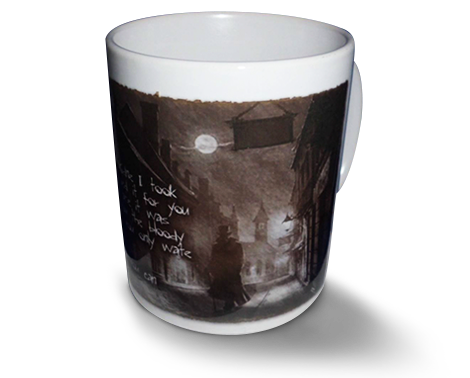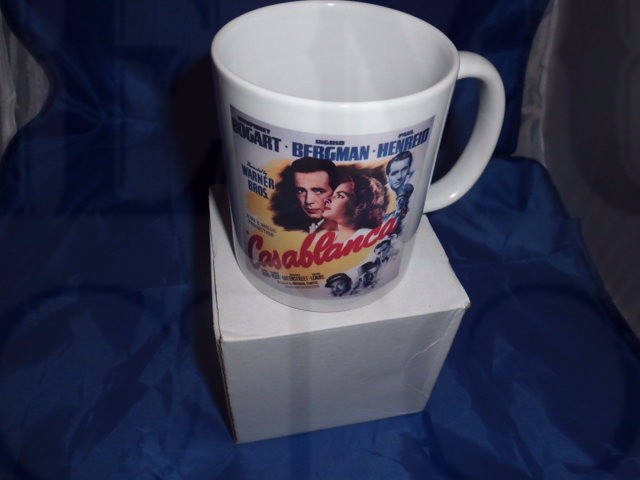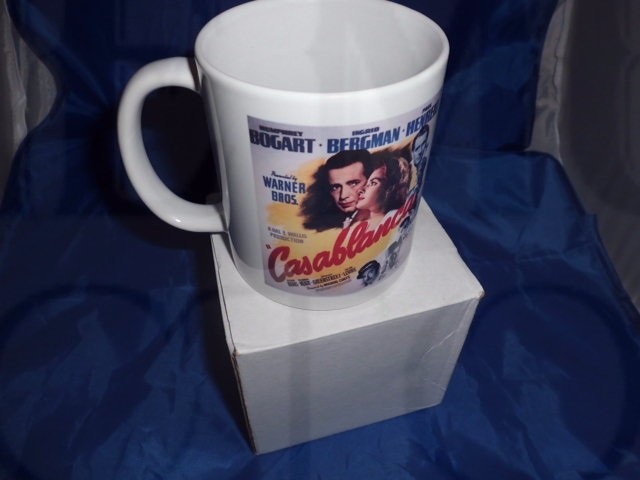Casablanca movie poster personalised mug
Start the day off right with a Casablanca coffee mug made just for you. Browse or personalise your own coffee mugs Casablanca - Humphrey Bogart - Ingrid Bergman - Coffee Mug A: Kitchen & Dining. @The Mug Factory
11oz Casablanca movie poster mug
Casablanca is a 1942 American romantic drama film directed by Michael Curtiz and based on Murray Burnett and Joan Alison's unproduced stage play Everybody Comes to Rick's. The film stars Humphrey Bogart, Ingrid Bergman, and Paul Henreid; it also features Claude Rains, Conrad Veidt, Sydney Greenstreet, Peter Lorre, and Dooley Wilson. Set during World War II, it focuses on an American expatriate who must choose between his love for a woman and helping her Czech Resistance leader husband escape the Vichy-controlled city of Casablanca to continue his fight against the Nazis.
Story editor Irene Diamond convinced producer Hal B. Wallis to purchase the film rights to the play in January 1942. Brothers Julius and Philip G. Epstein were initially assigned to write the script. However, despite studio resistance, they left to work on Frank Capra's Why We Fight series early in 1942. Howard E. Koch was assigned to the screenplay until the Epsteins returned a month later. Casey Robinson assisted with three weeks of rewrites, but his work would later go uncredited. Wallis chose Curtiz to direct the film after his first choice, William Wyler, became unavailable. Principal photography began on May 25, 1942, ending on August 3; the film was shot entirely at Warner Bros. Studios in Burbank, with the exception of one sequence at Van Nuys Airport in Van Nuys, Los Angeles.
Although Casablanca was an A-list film with established stars and first-rate writers, no one involved with its production expected it to be anything out of the ordinary.It was just one of hundreds of pictures produced by Hollywood every year. Casablanca was rushed into release to take advantage of the publicity from the Allied invasion of North Africa a few weeks earlier.It had its world premiere on November 26, 1942, in New York City and was released nationally in the United States on January 23, 1943. The film was a solid if unspectacular success in its initial run.
Casablanca went on to win three Academy Awards – Best Picture, Director (Curtiz) and Adapted Screenplay (the Epsteins and Koch) – and gradually its reputation grew. Its lead characters memorable lines,pervasive theme song all become iconic and the film consistently ranks near the top of lists of the greatest films in history.
Casablanca in December 1941, a cynical American expatriate encounters a former lover, with unforeseen complications.
Director:
Michael Curtiz
story of Rick Blaine, a cynical world-weary ex-patriate who runs a nightclub in Casablanca, Morocco during the early stages of WWII. Despite the pressure he constantly receives from the local authorities, Rick's cafe has become a kind of haven for refugees seeking to obtain illicit letters that will help them escape to America. But when Ilsa, a former lover of Rick's, and her husband, show up to his cafe one day, Rick faces a tough challenge which will bring up unforeseen complications, heartbreak and ultimately an excruciating decision to make.
multiple instances throughout the film where the action of Sam's hands on the piano bears no resemblance to the piano part heard. Especially notable is the first time Sam sings "As Time Goes By" for Ilsa; a rapid treble run is executed that would have necessitated the movement of his right forearm. None is seen.
When the bartender spins Rick around on his chair and kisses him on both cheeks, saying, "Boss, you've done a beautiful thing," Rick smacks him on the back and replies, "Get away from me, you crazy Russian." We hear the sound of the smack quite a while after Rick hits the bartender.
December 1941, American expatriate Rick Blaine is the proprietor of an upscale nightclub and gambling den in Casablanca. "Rick's Café Américain" attracts a varied clientele: Vichy French and German officials; refugees desperate to reach the still-neutral United States; and those who prey on them. Although Rick professes to be neutral in all matters, it is later revealed he ran guns to Ethiopia during its war with Italy and fought on the Loyalist side in the Spanish Civil War.
From left to right: Henreid, Bergman, Rains and Bogart
Petty crook Ugarte shows up and boasts to Rick of "letters of transit" obtained by murdering two German couriers. The papers allow the bearers to travel freely around German-controlled Europe and to neutral Portugal, and are thus almost priceless to the refugees stranded in Casablanca. Ugarte plans to sell them at the club that night, and asks Rick to hold them. Before he can meet his contact, he is intercepted by the local police under the command of Captain Louis Renault, an unabashedly corrupt Vichy official. Ugarte dies in custody without revealing that he entrusted the letters to Rick.
At this point, the reason for Rick's bitterness—former lover Ilsa Lund—walks into his establishment. Upon spotting Rick's friend and house pianist, Sam, Ilsa asks him to play "As Time Goes By." Rick storms over, furious that Sam has disobeyed his order never to perform that song, and is stunned to see Ilsa. She is accompanied by her husband, Victor Laszlo, a renowned fugitive Czech Resistance leader. They need the letters to escape to America to continue his work. German Major Strasser has come to Casablanca to see that Laszlo does not succeed.
When Laszlo makes inquiries, Ferrari, a major underworld figure and Rick's friendly business rival, divulges his suspicion that Rick has the letters. In private, Rick refuses to sell at any price, telling Laszlo to ask his wife the reason. They are interrupted when Strasser leads a group of officers in singing "Die Wacht am Rhein." Laszlo orders the house band to play "La Marseillaise." When the band looks to Rick, he nods his head. Laszlo starts singing, alone at first, then patriotic fervor grips the crowd and everyone joins in, drowning out the Germans. In retaliation, Strasser has Renault close the club.
play's cast consisted of 16 speaking parts and several extras; the film script enlarged it to 22 speaking parts and hundreds of extras.The cast is notably international: only three of the credited actors were born in the United States (Bogart, Dooley Wilson, and Joy Page). The top-billed actors are:
Humphrey Bogart as Rick Blaine. Rick was his first truly romantic role.
Ingrid Bergman as Ilsa Lund. Bergman's official website calls Ilsa her "most famous and enduring role". The Swedish actress's Hollywood debut in Intermezzo had been well received, but her subsequent films were not major successes until Casablanca. Film critic Roger Ebert called her "luminous", and commented on the chemistry between her and Bogart: "she paints his face with her eyes". Other actresses considered for the role of Ilsa included Ann Sheridan, Hedy Lamarr, Luise Rainer and Michèle Morgan. Producer Hal Wallis obtained the services of Bergman, who was contracted to David O. Selznick, by lending Olivia de Havilland in exchange.
Paul Henreid as Victor Laszlo. Henreid, an Austrian actor who had emigrated in 1935, was reluctant to take the role (it "set as a stiff forever", according to Pauline Kael), until he was promised top billing along with Bogart and Bergman. Henreid did not get on well with his fellow actors; he considered Bogart "a mediocre actor." Bergman called Henreid a "prima donna".
The second-billed actors are:
Claude Rains as Captain Louis Renault. Rains was an English actor born in London. He had previously worked with Michael Curtiz on The Adventures of Robin Hood. He later played the villain in Alfred Hitchcock's Notorious, reteaming with Ingrid Bergman.
Conrad Veidt as Major Heinrich Strasser. He was a refugee German actor who had appeared in The Cabinet of Dr. Caligari. He fled the Nazis, but was frequently cast as a Nazi in American films.
Sydney Greenstreet as Signor Ferrari. Another Englishman, Greenstreet had previously starred with Lorre and Bogart in his film debut in The Maltese Falcon.
Peter Lorre as Signor Ugarte. Born in Austria-Hungary, Lorre fled Nazi Germany in 1933 after starring in Fritz Lang's first sound movie, M (1931). Greenstreet and Lorre appeared in several films together over the next few years, although they did not share a scene in Casablanca.









